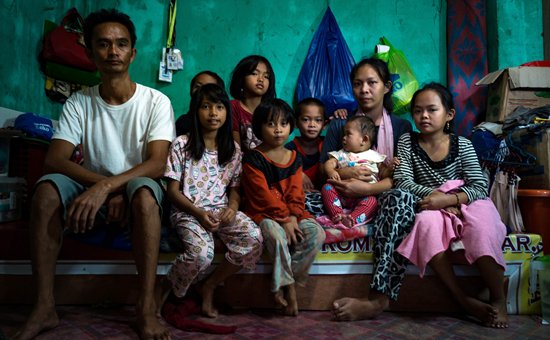|

Diane
Sumangan, her husband and their seven children have been in
Saguiaran evacuation center for a year. She says life in the
evacuation center is difficult. They are patiently waiting
for government’s advice on where they should go next.
(ICRC
/ R. Hashempour) |
Marawi conflict:
One year on, longing and uncertainty for displaced families
By
ICRC
May 23, 2018
MANILA – Around
230,000 people remain displaced and in need of stronger support one
year after armed conflict broke out in Marawi City, Lanao del Sur,
southern Philippines.
“Efforts to rehabilitate
Marawi and assist its people must be stepped up to reduce the
suffering of thousands of those who were displaced over the past
year. The efforts are there, but these must match the growing needs
of those who face prolonged displacement and are close to despair,”
said Pascal Porchet, head of the International Committee of the Red
Cross (ICRC) delegation in the Philippines.
With the response shifting
from emergency phase towards early recovery, food donations have
dwindled and livelihood opportunities are reaching only a few.
Majority of displaced families still depend on relatives or friends
for support, while those in evacuation sites continue to struggle
with poor living conditions in makeshift camps, increasing their
risk of illness.
“It has been a year since
the armed clashes began and we still don’t know what lies ahead. I’m
starting to feel the weight of it, and there are times when I feel
like giving up. But for the sake of my children, I strive to stay
strong,” said Diane Sumangan, an evacuee in Saguiaran. She is a
resident of Bubonga Marawi, one of the 24 villages in the main area
affected by the clashes.
The displaced families,
added Porchet, struggle to feed their families, buy medicines or
resume their small businesses due to lack of livelihood
opportunities or capital. Uncertainty about the future has added to
their worries.
Authorities estimate that
65,000 residents from the main area where structures were reduced to
rubble will be unable to return home for the next two to three
years. The transitional site in Sagonsongan, Marawi City, can only
accommodate 6,000 of them.
“The ICRC remains
committed to supporting those who fled the fighting, and to do more
by addressing gaps in the overall early recovery response, in
coordination with the authorities and other aid organizations,”
Porchet said.
“But, it is primarily the
authorities’ role to assist people affected by conflict. The pending
issues concerning the transitional site such as lack of regular
supply of water and absence of proper sewage collection and
treatment should be resolved soon,” he stressed.
Particularly concerned
about the pain of people whose loved ones went missing during the
fighting, the ICRC and Philippine Red Cross (PRC) are following up
on the cases of more than 100 families with the aim of tracing the
whereabouts of their missing kin.
“We are stepping up
efforts to accompany and support these families. There is a need for
a neutral and independent organization such as the Red Cross to work
in this field. We encourage those with information about missing
people in Marawi to approach the Red Cross,” said Adriana Uribe
Villa, who leads the ICRC’s response in Marawi.
The ICRC has been
supporting the Management of the Dead and Missing Cluster since the
start of the crisis for the retrieval, management and identification
of human remains.
Ever since clashes broke
out in May 2017, the ICRC together with the PRC has been helping
thousands of people affected by the Marawi crisis. It is now
focusing its efforts to help the remaining displaced families in
Marawi and in Lanao del Sur by improving their access to health care
and clean water and by supporting their livelihood recovery efforts.
“We plan to direct our
assistance to certain high-security areas of Lanao del Sur, where
the ICRC has access thanks to its links established with the
community and non-state armed groups,” said Uribe Villa.
The ICRC is a neutral,
impartial and independent humanitarian organization whose
exclusively humanitarian mission is to protect the lives and dignity
of victims of armed conflict and other situations of violence and to
provide them with assistance. It has an international mandate to
promote knowledge for and respect of international humanitarian law.